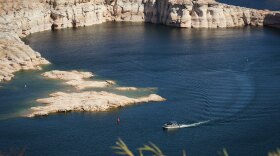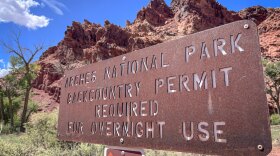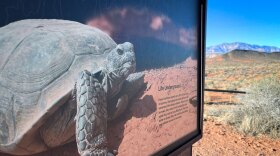
David Condos
Southern Utah ReporterEmail: dcondos@kuer.org
David Condos is KUER’s southern Utah reporter based in St. George. He covers the dynamics shaping life in communities across the southern part of the state with a focus on environmental issues. His reporting has earned several prestigious honors, including four National Edward R. Murrow awards, nine Public Media Journalists Association awards and eight Regional Edward R. Murrow awards. His radio stories have also regularly aired on NPR’s national programs Morning Edition, All Things Considered and Here & Now. Prior to joining KUER, Condos spent two and a half years covering rural Kansas for High Plains Public Radio and the Kansas News Service. He grew up in Nebraska, Colorado and Illinois and graduated from Belmont University in Nashville, Tennessee.
-
Las históricas guías de viaje para personas afroamericanas, como el Green Book no incluían muchas opciones seguras de alojamiento en el suroeste de Utah. Sin embargo, el albergue del Parque Nacional Zion fue un refugio poco común.
-
The Colorado River Basin appears to be gearing up for a legal fight. And the federal government is weighing its options for making the states share the shrinking river.
-
Conservationists view the Trump administration’s move as another attack on the national parks. But southeast Utah officials say there may be other ways to ease crowding at Arches.
-
Historic Black travel guides, like the Green Book, didn’t list many safe accommodation options in southwest Utah. The Zion National Park Lodge, however, was a rare refuge.
-
New data shows how the number of residents walking and biking around town keeps growing. And the southern Utah city plans to add even more miles in 2026.
-
Critics and environmentalists see Trump’s decision as “moving backwards to an era” where environmental effects, like the ones Utah already experiences, are ignored.
-
The lawsuit argues the approval of the highway near St. George breaks multiple federal laws, including the act that established the Red Cliffs National Conservation Area.
-
Utah’s statewide snowpack level has reached a record low. Much of the West is in the grip of a snow drought, impacting everything from water supplies to mountain forests.
-
A new plant that cleans and recycles more sewage is another big step toward stretching Washington County’s limited water supply. It highlights the massive effort and big money it’ll take to keep the St. George area growing in the desert.
-
The Milken Institute put southwest Utah’s largest city in its top spot for the first time. The ranking highlights St. George’s job growth and wage growth, both among the nation’s highest in recent years.
-
A plan to build a highway through the Red Cliffs National Conservation Area near St. George is back. But public lands law experts from across the country question if the Trump administration is missing Congress's original intention.
-
The contentious highway would run through Red Cliffs National Conservation Area near St. George, a landscape that’s home to the threatened Mojave Desert tortoise.











